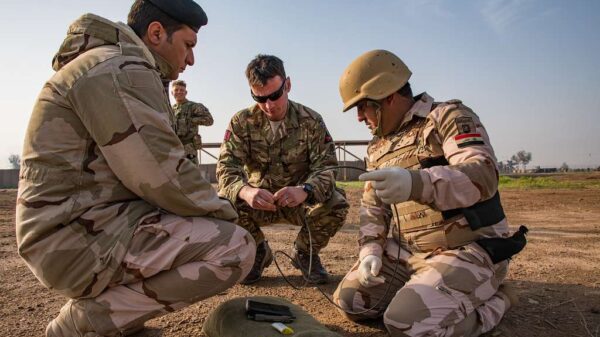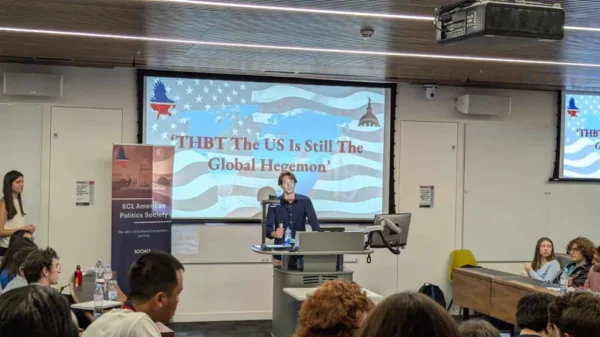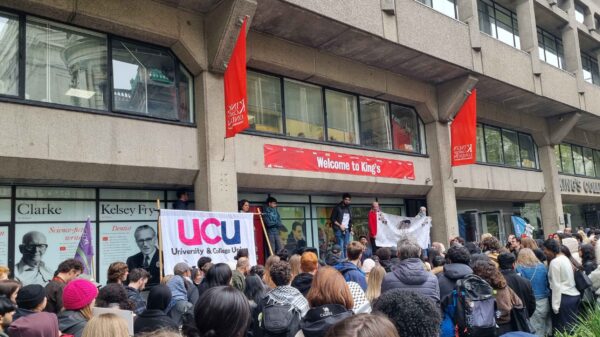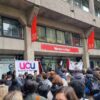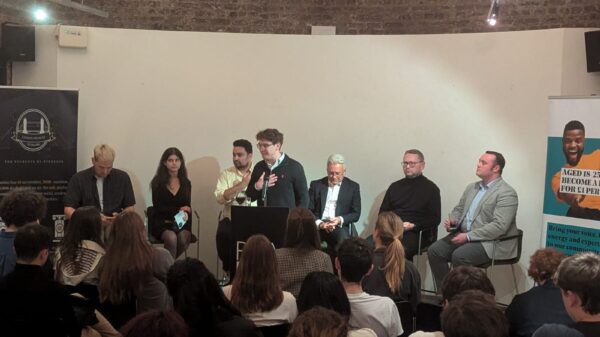Comment Editor Ruth Otim argues for political participation beyond the ballot box, pointing to the impactful youth-led protests in Bangladesh and Kenya that challenged corruption and demanded deeper democratic reforms in 2024.
This article was first published in print on 16 September 2024.
This year has consistently been marked as the ‘Year of the Ballot’ as more than four billion people internationally have been, or are still, eligible to cast their votes in their nation’s elections. What was less expected, however, was that 2024 would also see hundreds upon thousands exercising a different constitutional right: the right to protest. Young people, in particular, have harnessed the tool of mobilisation to take political reform off the ballot paper and into the streets. The most remarkable political statements so far came from Bangladeshi and Kenyan students this summer.
Their causes, strategies and outcomes were diverse, but the root of their issues conjoin their plights internationally. Looking back at the protests held in Bangladesh and Kenya, one bears witness to how the mobilisation of Generation Z in the Global South is not the spark of the moment but a culmination of policies against their collective political favour. It is worth looking at how our generation in Bangladesh and Kenya, outside of the Western paradigm, has engaged in unprecedented protest that is setting the tone for how we envision political participation and liberation.
The Bangladeshi and Kenyan Protests
Although the entire political history of both Bangladesh and Kenya cannot be summed up briefly, covering the key aspects that led up to the protests establishes the necessary context. In Bangladesh, protests began in early July over the quota system within the civil service that designated one-third of civil service jobs go to descendants of Bangladesh’s Liberation War Veterans from the 1971 war for independence from Pakistan.
What caused the reaction of student protestors on 5 June, and later others, was the Bangladeshi High Court’s verdict to reinstate the quota system. The verdict overturned former Prime Minister Sheikh Hasina’s 2018 decision to throw it out. University students from Dhaka University were some of the first to protest this, depicting the ruling as being in favour of a discriminatory and outdated system. Through their protests, they hoped to reach Bangladesh’s political class and prompt it to support a more merit-based system.
Civil service jobs pay well and are stable. The BBC reports that around 18 million young Bangladeshis are seeking employment, with university graduates facing unprecedented unemployment rates. Aside from the economic aspect of such jobs, students noted how the quota system also favours those with connections to the ruling party.
Students, as well as journalists and political analysts, recognised the quota issue as the “tip of the iceberg” of the overall discontent young people have faced in the country. Their protests began peacefully but as mid-July rolled in they became increasingly violent, with protestors affirming that the violence and climbing death toll was caused by the police. The internet was shut down, followed by a nationwide protest, culminating in the Supreme Court’s removal of the quotas. Now, 93% of jobs are awarded on merit.
In the aftermath, the protestors’ demands renewed as they fought against the arrests of nearly 2,700 protestors and the deaths of 150 student protestors. Protestors called for the removal of prime minister Sheikh Hasina. The protests in Central Dhaka resulted in the deaths of 100 people—ultimately causing Hasina to resign and flee to neighbouring India.
The turmoil of the Bangladeshi protests removed a prime minister. In Kenya, however, the calls for President Ruto’s removal after a month of protest against the controversial Finance Bill 2024 have led to far more ambiguous conclusions for the future of the country.
In Kenya, young people took to the streets in June to protest the proposed Finance Bill 2024 that would increase taxes on basic commodities such as diapers and cooking oil, amid the already high cost of living standards for the average Kenyan. Protestors called for the removal of the bill on the streets and all over social media with the hashtag #REJECTFINANCEBILL2024 from TikTok to X (formerly Twitter).
The impetus behind the Finance Bill comes after Ruto sought to cover Kenya’s debt at approximately $80 billion, both foreign and domestic, owed to foreign creditors and international fiscal groups such as the World Bank and the International Monetary Fund (IMF). To meet the reforms of these groups and clear the debts with foreign creditors such as China, Kenya looked to its citizens to pay the bill.
Ruto ended up acquiescing and removing the bill by June 26, but the pathway to political action was not free of violence. Several days before, police had used “tear gas and live ammunition to disperse protestors, killing two and injuring dozens”, reports Crisis Group. By the time Ruto cancelled the bill, the Kenyan National Commission on Human Rights reported that 39 people had been killed during the protests.
The removal of the bill no longer met the demands of protestors as they began to seek the removal of Ruto himself. Ruto was not only criticised for his deployment of police that cost the lives of protestors but also for failing to keep his election promises of reducing nationwide economic burdens. Throughout his election campaign, he promised to build a “hustler nation” but seeing as the Kenyan youth comprise 68% of unemployed people, burdened by the cost-of-living crisis, promises made have been promises unkept.
Young Kenyan protestors went out to the streets for far more than the economic downturn in the country. Al Jazeera called the Finance Bill simply the “last straw that broke the camel’s back”. Kenyans no longer trust their government and believe they have their best interests at heart. The mass mobilisation of young Kenyans, under the banner of “Gen Z’s protests” as noted by the Centre for Strategic and International Studies, from diverse backgrounds and across social media platforms demonstrates the unwillingness to accept the status quo.
Our struggles are all connected
They may appear different at first, but the Bangladeshi and Kenyan protests demonstrate how the struggles of the youth are connected internationally.
Both Bangladeshi students and young Kenyans are facing high unemployment rates, despite being increasingly educated and eager to contribute to their countries. The long-standing corruption within their countries has continuously hampered their financial security and political representation. Within Bangladesh and Kenya, corruption has not simply existed at the executive level with Hasina and Ruto but followed through onto the streets with the soldiers of capitalism: the police. Hasina in particular was viewed by many in Bangladesh as an autocratic dictator who ruled with impunity, whilst attempting to present a perfect democracy to the rest of the world.
The escalation of violence with the presence of militarised police in Kenya and Bangladesh reminds us that police presence protects capital, not the people. In fact, the presence and escalation of violence through the police contributed to changing demands amongst young protesters in both countries. In both Bangladesh and Kenya, after the Bangladeshi Supreme Court withdrew the quota system and Ruto revoked the Finance Bill, the deaths of fellow protestors following police intervention renewed calls to clamp down on the larger face of corruption.
In the same way that the Finance Bill and the quota system were the tip of the iceberg for the young protestors, protests lie at the very beginning of systemic political reform. In that way, young people can chip away at the roots of their problems which continue to be plagued by mass corruption and increasingly autocratic measures taken within so-called democracies.
Especially with relatively young democracies in the Global South, protests are a part of our democratic character as legacies of our decolonial fervour from not too many generations ago. As Bangladeshi and Kenyan protestors within our generation protest and risk their lives, we must remember that democracy is a deliberative process and freedom is a status quo we must continue to uphold.
These young people have proved through their tenacity that there is power in our collaboration. There is a reason why the internet was shut down in Bangladesh; there is a reason why so many young people came onto the streets of Nairobi and Mombasa to protest. Social media can be a democratising force if used responsibly. By amassing young people to mobilise online, you can bring them out into the streets as well.
The internet and social media threaten autocracy and corruption because they democratise information. It turns our demands from the individualistic to the collective. Particularly when politicians tell us that they work in our best interest, such as Ruto promising economic reform from the “bottom-up”, our demands are not aesthetics nor political points to garner votes.
Although it is the ‘Year of the Ballot’, do not forget that your political representation is not limited to a ballot box. With the young people of the Global South rising beyond just Bangladesh and Kenya, as well as the ripple effects they are leaving on their respective continents, we must remember our struggles are just connected and shared.


